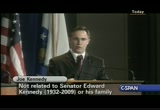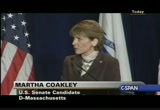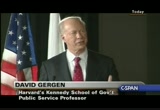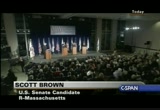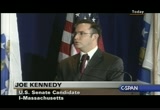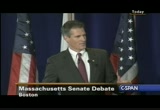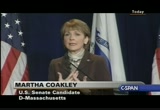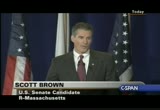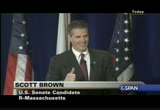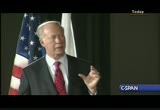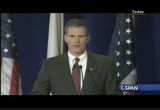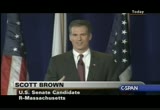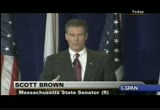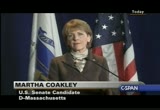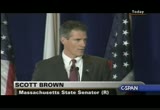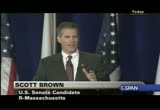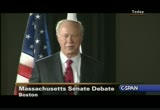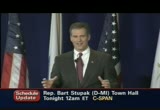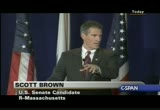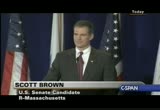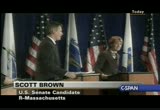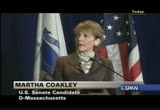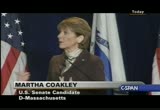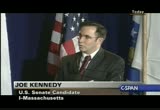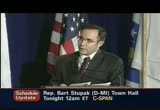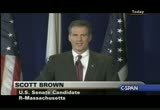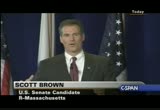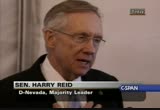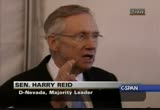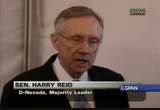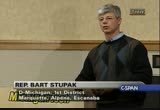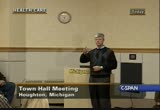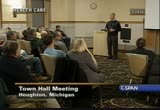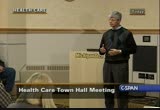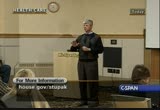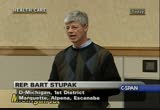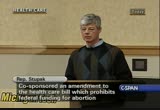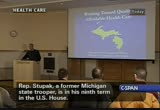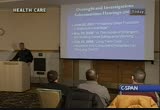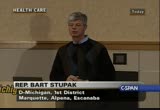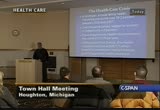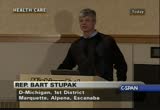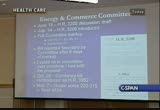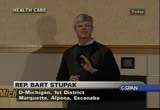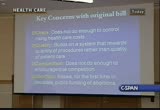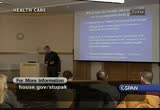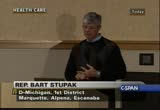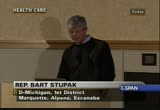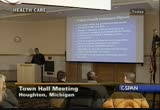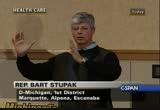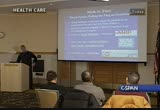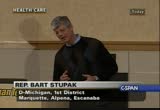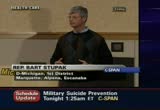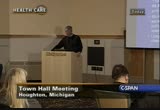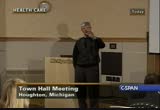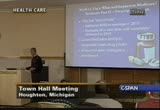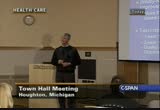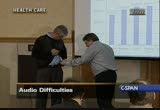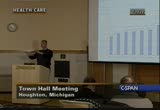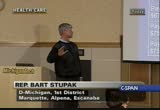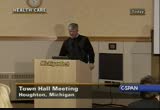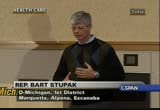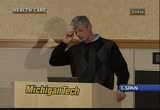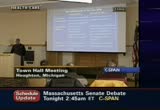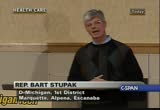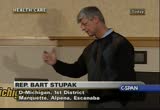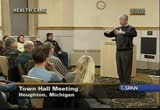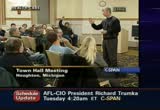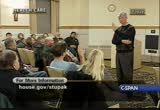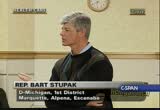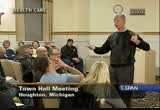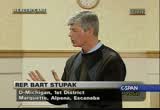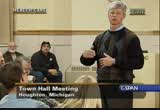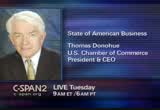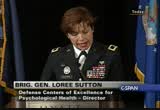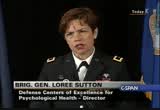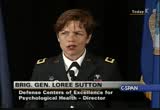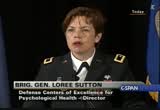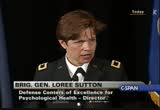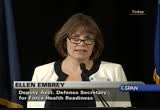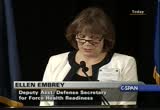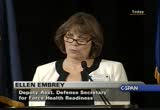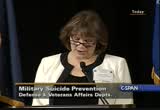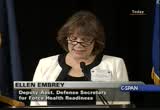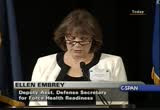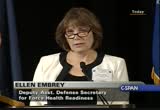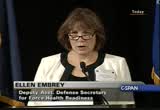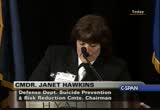tv Capital News Today CSPAN January 11, 2010 11:00pm-2:00am EST
11:00 pm
vote down health care. it will be bought because of the politics as usual going on in washington did the question is, who is going to work to repeal it once it passes? we have an issue in government that it is too big. this bill will cost $1.20 trillion, so it is planning what that number means. our federal income tax is only $1.10 trillion. that means an 11% increase on everyone at minimum to pay for this bill. we cannot afford it, we should not do it. health care in massachusetts is going up rapidly and it will let the federal level as well. >> mr. brown. >> we have this in massachusetts. that is why people actually come here. not only is this bill going to be bad for our state, my job as
11:01 pm
11:02 pm
here from the so-called plans that union members are getting, businesses,, -- down to the [unintelligible] we should not have to go to washington every time to get handouts. we should be able to fix the problems on our own and we can do that easily. >> can you promised the voters if you are elected you are a going to vote regardless of how it is changed? >> what i have said is i support the plan coming out of the senate. >> water becomes more restrictive? >> i would not vote for a plan that had stupak on it. >> you will only vote for the senate bill. >> it is not going to be a senate bill. the bill is going to be a compromise.
11:03 pm
regardless of what version comes out, this bill is not good for massachusetts. it will cost us jobs ant a time we cannot afford it. >> you said you are for health care reform, just not this bill. we know from the clinton experience that if this bill fails, it could be another 15 years before we see a health care reform effort began in washington. are you willing under those circumstances to say i'm going to be the person, i will sit by and teddy kennedy's see? >> it is not the kennedy seat or the democratic seat. they have a chance to send someone who is an independent voter and thinker and look out for the best interests of the people of massachusetts. i would like to send them back to that drawing board. people should have insurance. it is not good for the entire country. we're talking about an additional zero trillion dollars in costs and half a trillion -- if your a veteran you are having
11:04 pm
cuts in tricare. no one has confidence in this bill now. >> this morning the head of the afl-cio said that it would be a recipe for disaster if the final health care bill includes a tax on high-end insurance plans. what is in the senate bill. senator obama says he is for that hat -- tax on plans. where do you come down? >> the president said he thought there was room to determine what is going to be in this plan spread may be the broad -- the net could include a couple of toyotas. i do not agree with that and there are different ways we could pay for that plan. >> this is not about cars, it is
11:05 pm
about health care. the plans we're talking about here -- is going to be taxing those cadillac plans for those union members who have fought to get those plans. how are you going to pay for this? cutting half a trillion dollars out of medicare and you are going to be taxing people at a time they cannot afford it. we can do better. we can go back to the drawing board. it will not take 15 years. not on my watch. i will make it a priority to have coverage that states can rely on and have the flexibility. not a one-size-fits-all for the country and the hurting states. >> i am going to turn to you and you can -- all of you have talked about the economy. voters put jobs at the top of their list. everyone is worried about 10% unemployment. it is also true that this
11:06 pm
terrible economic situation workers find themselves in comes at the end of a lost decade for american workers. there has been nationwide, no net job growth since december, 1999 and middle class families when adjusted for inflation have not seen their incomes rise. what are your plans not only short term but what is the answer to the long-term challenge for jobs for americans? >> if i can no to that the congressional budget office says within 10 years that health care plan will be deficit neutral. one of the reasons we have issues is because during the last decade we have not had regulations that have kept the economy in check. with predatory lending. with the bush-cheney tax policy that supported the haves and have mores -- he wants to go back to the drawing board. he wants to go back to those bush dashed any policies that provide for the wealthy. i supported and i said i support
11:07 pm
a plan that will provide tax relief for that -- relief for the middle class. to provide for tax credits and more landing opportunities for small businesses which will be the engine that will get this economy moving again. >> these wages have not risen in america since 1972 so it is not just the last 10 years. we have lost 40 years. we need to get the economy going. the way we do that is cut spending. harding did it in the 1920's and we have not done it since. we continue to spend money on wars and on entitlement plans. these things draw money from the private sector into the public sector and year after year, we see the public sector growing. we see people not getting real wage increases. that is what is going on. until people are willing to cut spending, cut entitlements and stop going to war around the
11:08 pm
world which is extremely expensive, we are not going to fix this economy. there is no way, shape, or form. we have a number of bureaucracies in government. we have wasteful spending of in government and nobody is holding them accountable. somebody needs to stop the war. somebody needs to pull back the entitlement programs and somebody needs to give the money back to the taxpayer. que>> congressional budget offie is going to take 10 years. we will be subsidizing other states for the next four or five years but we will break even. that sounds like a bargain. i would rather send it back to the drawing board. regarding tax cuts there is no one who was listening [unintelligible] i have a history of cutting taxes, holding the line on spending. i've been fighting on beacon hill against the machine who wants to raise your taxes. gov. patrick and everybody else.
11:09 pm
we can do better. regarding your comments about bush-cheney this and that, you can run against bush-to any but i am scott brown. i drive a truck and it is over to a dozen miles on it. you are not running against them. you are running against me. the difference between us is you want to raise taxes. on items that you were vocal about during the primary. it is not $2.10 trillion what is the number you want to raise taxes? >> it does not matter how many times you say $2.10 trillion. it does not make it accurate. it is not a number because what i support our relief for the middle class. the cuts that president obama support, health care plan that will be self supporting. your response to health care costs is to make sure that we let insurance companies
11:10 pm
[unintelligible] sot hat is not a good way to go. we have an energy policy that will make polluters pay. those numbers -- we are down to zero. your the one who bought it while you were in the senate for over $7 billion of spending in the commonwealth. you voted for $300 million of fees so let's get that rhetoric straight. i am not [unintelligible] i brought back $1 billion back to the commonwealth as attorney general. >> i have never voted for a tax increase while elected in office. the items you're talking about -- it is outrageous that you would say i would not be supportive of women's rights and protecting mammogram covered. that is the basic coverage in
11:11 pm
our health plans. when we refer mandates and look at them to save money that is important. the health-care bill your pushing and you will support -- to have said it. it raises the age of getting a mammogram coverages from 40 to 50. it sets limits on pabst mara liasson testing. it cuts half a trillion dollars for medicare. [unintelligible] review mandates to make sure we do not have [unintelligible] we can do better with the plan we have. >> we can agree to disagree but let's be clear on the facts. you cannot distort my record and i will be accurate about yours. i have not proposed any new taxes except for those on the wealthiest 2% of the country. that is all i have ever talked about. let's be clear. what i propose is going forward
11:12 pm
to make sure we cannot afford for health care. it is 8% to 10% a year going up. >> you are in favor of cap and trade. >> it is not a tax. >> our favorin -- you are in favor of the tax cuts coming back. the tax credits are coming back. i am sorry. >> i hear you talkinhg about tax cuts to create jobs. the importance of that. there is the second issue. that is the deficits. the truth of the matter is over the horizon are these massive deficits. we have 1.4 trillion dollars now but every year, the amount is
11:13 pm
one trillion dollar -- $1 trillion more. >> the answer here is i have been saying. nobody to my right has been willing to talk about spending cuts and everyone who says -- >> what would you cut? >> i do not think we have enough time. i will cut obamacare when it passes. i will cut every single hack job that is out there that exists today. i will audit the federal reserve and i will see to it that there is -- if there is corruption there we will cut that as well. i will stop spending money on the wars. we have people in japan and in germany to defend wealthy nations today. you know who pays for? we pay for. everyone is incorrect when they say that cutting taxes creates jobs. that is not the truth.
11:14 pm
cutting spending historically is what creates jobs. when you cut taxes and you do not cut spending, we get what we had in the bush administration is -- which is what it bankrupted our country. >> we need to do it jfk style across the board. for businesses and families that will create jobs. we have done a stimulus 1. we're looking at stimulus two. when it be nice to try something different? the stimulus bill has not been working and it has not created one job. we're 49 at a 50 in releasing the money we have. how can we talk about other -- about another stimulus bill when the other has not worked. the spec -- get back to basics.
11:15 pm
[unintelligible] it is important to do that. that is the difference. her tax proposals will not help but all. it will add to the deficit. the cap and trade scheme will increase taxes. that is the major differences. >> i think the question was about the deficit. let's remember the history here. when the democrats had the presidency we were at a pay-as- you-go. that went out the door with the bush-cheney deposition. -- bush-cheney administration. to me it is astounding that scott brown will stand here and say that this problem must have come out of nowhere. his solution is to do nothing
11:16 pm
except to make sure that we do some kind of across-the-board tax cut. it is not going to work and what i have said in what he knows i have said is we need to get tax revenues that. we need to get the engine of this economy running again. >> how would you get tax revenues that? >> getting people back to work. >> president obama has made the vow no tax increases. the a join him in that pledge? >> i do. >> you think you can balance the budget? >> not overnight. it was greeted by reckless administration. we have a lot of work to do. those are complicated problems. >> the tax cuts we're talking about will create an immediate jolt to the economy and create jobs.
11:17 pm
to think that it is all about bush-cheney, there is plenty of blame to go around. i am looking to address the mistakes of today. there are clear differences between the to a bus on those issues and if you think a tax cut is not going to work that i think you are sadly mistaken. >> we have gone through tax cuts in the bush years and we did not have this booming growth which you have assumed and the congress has -- people have been afraid to take on the entitlement programs. i want to know if you are taking on the entitlement programs or are we going to duck and see these costs go through the roof? >> i am the only one who has talked about spending. spending is something that is difficult to cut. it is difficult to say, we have to cut entitlement programs.
11:18 pm
there is a lot of fat. no one wants to talk about cutting spending is because they cost votes. every single time you got there and say i will cut your taxes and raise retirement program, you're lying to get votes. we have to cut spending. >> medicare, medicaid, and social security. where would you cut them? >> i am ready to take on the entitlement programs. >> senator gregg has filed a bill. you look at the entitlements and you have a bipartisan commission that will look at everything and make a recommendation. i look forward to that opportunity. >> would you support tax increases? >> i think we can do better. i would certainly look at entitlements and make that recommendation. at least we have the choice and that is what is important. >> we spent a lot of taxpayer
11:19 pm
dollars on bailing out big corporations, millions and billions of dollars on stimulus money. taxpayer dollars that did not have to be spent if we had done better regulation. i will not say we're going to take away social security from our greatest generation, with folks with whom we have a contract. there have to be ways that we reach our obligation on that. i think we have to start with where the blame falls and where we turn this around. >> bottom line? what is your position on whether the congress ought to consider and be open to reforming social security, medicaid, and medicare in a way that brings down the costs on all three programs. >> i believe that everything can be looked at but i will say this. i think that if we look at new generations coming in who do not have this entitlement, this is
11:20 pm
not the first case i will look. >> is it a place where you are willing to look because that is where the money is. >> there is a good reason for that. this is about more than the budget. people depend upon that for health care. >> it is not about blame. it is about solving the problems of today. we have to do a top to bottom review to make sure as the president called for. we can do it in washington. we need to forget about blaming people. there is plenty to go round. let's solve the problems of today. you need to look at every other program and project in washington. >> let's move on. i would love to work through these more deeply. the clock is working in another direction. i would like to go to a new question.
11:21 pm
the president declared we are in a war against al qaeda. how do we win the war? >> we're in a war. it has happened here. the attempt by the person who tried to kill our kids at the mall. i am glad he is realizing we are at war. he was slow in reacting to that situation. martha believes that these individuals should be given constitutional rights. attorneys -- a lawyer dubbed so they can take the fifth. they should be treated as enemy combatants and they should be interrogated pursuant to laws of the land and make sure we find out if there is any of their attacks coming. that is a major difference. half a billion dollars it is going to cost.
11:22 pm
khalid sheikh mohammed is taking the fifth. he is getting information from us. martha agrees with that. he should be treated as an enemy combatant and go through ita military tribunal. the training i have, i am looking forward to that opportunity. >> there is nothing more important than keeping this country safe and keeping our homeland security save. we need to do it as smartly as we can. we have been at war since 9/11. i have worked as a district attorney and an attorney general everyday sense columbine, keeping our kids safe and working with federal and state authorities and local police, fire, to make sure that 9/11 never happens again. that means that we have to be smarter and we have to work better to use better intelligence and analysis about where al qaeda is and how we will neutralize them. i am surprised at scott because
11:23 pm
he is a lawyer and he does defense worke and he understands what constitutional rights are about. we need to do whatever we can to keep our people say. as we move forward, we have to make sure that we have the right intelligence and move properly and when we should try people in military tribunals, do that as we can be successful. >> if we want to secure the people of america, we have to not say, where we're at war with al qaeda? we need to understand why is al qaeda at war with us? we occupied nations in the middle east. if you are growing up and you have someone from a foreign nation walking up and down your streets with a machine gun, you're going to grow up hating the country. you are just going to trade when you turn 15 or 16 it will be
11:24 pm
easy to recruit you to come over and kill us. that is what is happening. the reality is if we want a safer country, we need to not occupy these lands. we need to take an pullback the individuals who are deployed today. we need to take the money that is used to pay for the deployment and use it internally to secure our borders. if we focused on securing america and did not go over there and interfere in their lives would have fewer enemies and we would be concentrating our forces where we need them. which is in america. >> thank you. i'm glad you recognize my service. i may lieutenant colonel with 30 years in the military. i do not recall a time we have given constitutional rights to terrorists [unintelligible] to think that we would give people who want to kill us constitutional rights and lawyer
11:25 pm
them up at our expense instead of treating them as enemy combatants -- it makes no sense to me and shows me that you do not understand the law when it comes to enemy combatants versus terrace. >> the reason we started the designation is we would make sure we treated people appropriately. we still and always will have the option to get better intelligence to treat people in the military enemy combatant form. >> in a standard differences on the legal treatment of prisoners. what i would like to understand is how you would win the war on the ground. >> i agree with the president. that is another difference. i support his effort to finish the job in afghanistan.
11:26 pm
the president thought after four months what he would need to do to finish the job is to make sure the taliban and al qaeda deny get nuclear weapons and exports more on the world. it is simple. how do you do it? you make sure we support our troops and our president. we're at war have at our airports and shopping malls and i have to be honest with you. as you are listening, i am scared at the policies i have heard. i want to know when the next terrorist strike will happen. we will not find it by the policies or pushing. i support the president and i am proud to do so. >> certainly we have had over -- almost 200 trials that have been successful in holding people accountable when they have been designated by the bush-cheney administration as enemy combatants. they have made that decision.
11:27 pm
the attorney general can and will do that. i do not agree with the decision to send troops to afghanistan. scott selectively picks and chooses whatever he thinks is the right policy for this country. >> how do you think we succeed in afghanistan? >> i think we have done what we are going to be able to do. >> should we come home? >> we should plan an exit strategy. >> how would we succeed? >> i am not sure there is a way to succeed. if the mission was to go in because we believe the the taliban was giving harbor to terrorists, they are gone. let's focus on wehrhere al qaeda is. >> would you send troops to yemen? >> this is not about sending troops. we have all kinds of resources at our disposal including cia.
11:28 pm
our allies to work with us and the focus should be getting the appropriate information on individuals who are trained to represent a threat to us and use the force necessary to go after those individuals. >> let me explain what the mission is. to make sure the taliban and al qaeda have not joined forces and get nuclear weapons and export them around the world. to think that al qaeda is not everywhere we're talking about and we should not be going and addressing these real concerns is naive. we have some real problems. >> it is naive to think that we have the troops to send everywhere and they are the best way to go after people who are terrorists who disappear into the night and who get -- do trainings and then disappear into the night. >> you are saying that once we catch these people, we are
11:29 pm
giving them constitutional rights. >> that is not what i said. >> the bomber at christmas, you said that is okay, he should be cleared up and you did not disagree. we should have taken the time and interrogated him properly. >> we have information from him. neither you nor i know what that is. >> we're going to change the format. we will allow each candidate a chance to ask the other cat it's a question and get a minute long response. >> you supported legislation that would allow hospital employees to deny emergency care to rape victims of it was there
11:30 pm
choice. you have also received the endorsement of the massachusetts right-to-life organization that said it will be about four right-to-life in the senate. you accept their endorsement or do you this about that? >> i have a big tent. it is about everybody and i welcome everybody support. you have many special interest groups. i did vote on a vill bill to aw women who are raped to get treatment. we have a difference. i am against partial birth abortion. you're not. you criticized partial birth
11:31 pm
abortion. the fact is not allowed. we also have a difference in that i do not believe federal funding of abortion should be allowed. i believe in a strong parental consent notification law. you will go down there to file bills as a social crusader. i want to deal on the issues that are important. to think that i would especially with my young daughters here, to think i would not allow them the opportunity if they were raped to have the 8immediate attention -- to and for that i would not do that. >>-- infer that i would not do that. >> an i incorrect -- am i and
11:32 pm
correct? >what does that amendment do? >> let me answer the question. the amendment you are referring to allows hospitals who have religious preferences not to perform abortions or provide those services. >> emergency contraception? >> i am not a defendant. >> that was supported by many people. >> think it is a correct position. -- you think it is the correct position. >> they can be turned away? >> it is important that you would try to twist this bill round. >> we are moving to one question. mr. kennedy? >> we have a health care bill
11:33 pm
in front of us that will cost $1.20 trillion. the total amount of money that is raised on a yearly basis by all taxes that come in is at 1.08 trillion dollars. this is over a 10 year. -- 10-year period. are you willing to increase taxes and it will not be done with just taxing the wealthy? >> everyone appreciates that health care needs reform and it is complicated and we can throw numbers around and argue about it. what they're requires is getting down and figuring out as we did in massachusetts, we cannot afford not to do health care
11:34 pm
reform so we can figure out how we have to -- what we will save by early prevention and screening. the ways we pay for these services. we paid too much for the results in health care. >> the numbers i am giving you are numbers from the government. the tax foundation. >> the congressional budget office' said this will be budget neutral. we will see people who do not have health insurance get it. we will see people pay out of their pockets to get screenings and they need less invasive procedures. the insurance companies saved money on a friend of mine while she paid $3,000 for a screening test. it does not take care of people it is supposed to. we are not going to do this
11:35 pm
overnight. >> you have the chance to ask one of the candidates a question? >> we are both good people. we have differences. many differences. i happen to think you are wrong in the policies. one of this is an issue on terror. you want to treat them like ordinary criminals and i do not. a simple question. khalid sheikh mohammed has -- he will be tried in new york and at taxpayer expense. you supported that. if he is found guilty of killing almost 3000 innocents, will he get the death penalty? do you agree with the fact he should get the death penalty? >> yes, because that is what the federal [unintelligible]
11:36 pm
>> i am not in favor fo it. he was not tried in a military tribunal. it is the attorney general's decision. we have done it successfully many time. the 200 trials, they have made a decision this is where to go. if he is found guilty, he will not be walking down the streets of manhattan. i would support the laws of the land. >> he was treated as an enemy combatant. >> why didn't they bring him to justice? >> he was interrogated and found a valuable information by taking [unintelligible]
11:37 pm
>> let's move on to the next round. we will have time for closing statements. i would like to raise some concerns that are out there on the campaign trail. if you could answer a couple questions. there are those who argue that you are campaigning as a moderate republican, but you are quite conservative on some issues. roe v. wade, you said that is the law of the land. do you respected? you have been endorsed by right- to-life groups who have campaigned for you. what's your preference be to see roe v. wade overturned? >> no. i know you're not from this area. i have a long history of service. 30 years in the military.
11:38 pm
i live in a house full of women. to have people twist my record around -- >> the support roe v. wade? >>-- do you support roe v. wade? >> [unintelligible] >> someone ask you if climate change is a big fraud and you said let's wait and see. do believe that global -- do you believe that global warming is caused [unintelligible] >> the climate is changing all the time. the question is what we do. >> you said -- you responded that you need more accurate information.
11:39 pm
>> that is not accurate. >> it was reported in the newspapers. >> i will tell you what my position is. the climate is always changing. there is a question whether it is man-made or natural. it is probably a combination. how do we address it? you're asking how we address it and we need to make sure we need to do a bunch of things. one is the last time we build a nuclear power plant to step back on dependence on fossil fuel? in the middle of a recession, martha was in favor of a cap and trade position that would make [unintelligible] i want to make sure we address the fact we can step back from the usage of fossil fuels. it is simple. >> there are some who wonder whether you have as a front runner been sometimes complacent. --i am looking back on whether t
11:40 pm
was a right decision -- [unintelligible] >> it was a good decision. joe has added a lot to the debate and the discussion. i am familiar with debates here in massachusetts. it is people who are on the ballot -- they should be able to get up when it is a public sponsored debate and have voters judge them as i would scott or me or anyone else who gets on the ballot. we have had plenty of opportunities to go one-on-one on issues. there are lots of ways in which voters compare us. everyone has access to this. it makes a lot of sense. >> do you have second thoughts about the way our campaign has unfolded? >> campaigns are not dress
11:41 pm
rehearsals. they move forward at their own pace. we have had a tough primary. we're doing the same thing in this. we have worked very hard. i did take christmas day off. i did not think voters want to hear from me on christmas day or christmas eve. to suggest i am taking this for granted or not working hard. it can look at our policy papers and volunteers and phone calling. i do not know what will happen on january 19. i am asking voters to vote for one of the three of us, hopefully me. we're making sure we get our message out. >> you have run a tough campaign. you are in a situation where it comes to the final days and you are far back. do you have preference between these candidates as to which one you would like to see when if you do not? >> the most important thing here, i will answer your
11:42 pm
question. the most important thing that we do here as a third-party candidate is to get the message out. none of these candidates has been willing to talk about spending. if they cannot talk about spending, we cannot have any intelligent discussions around the economy. my answer would be whoever can start talking about cutting, of spending, neither has been willing to do so. who would support would be the person who, whenever they decide to, sir is being realistic about what is going on with the economy and talk about cutting spending. >> you have one that is closer to your model? >> i think that scott talks about cutting taxes which is part of the way there. my issue with scott is that last year, he had the opportunity when we had the referendum to cut the income tax. he has been calling for across- the-board tax cuts.
11:43 pm
we had the opportunity to -- he publicly came out against it and it was voted down. that is $3,700 that could have gotten out to everyone. now that he is running he is calling for the exact same thing that he did not want to have a year ago in the same economic conditions. how do voters trusted? i do not know. >> i would like to turn to one final question. it is more personal in nature. in talking to people, there is a common refrain. people since they knew ted kennedy very well as a human being. he was a senator for a long time. they have a lot of respect for you but they do not since they know you very well. they have had a hard time penetrating. getting beyond what you have said in your advertising and the
11:44 pm
stump speeches, can you give us a personal insight into what you would like the voters to go to the polls thinking who you are as a person? >> i think that is a great question. part of that is we are constrained by these forms. i am pleased my husband is here and my sisters and my nephew. i come from a big family. my mother was the youngest of 10. my dad owned an air insurance agency. i am driven by the work i do, passionate for victims, domestic violence, kids, keeping them safe. i do take my work seriously. i do not take myself so seriously. i can be funny, believe it or not. most people do not think that and they are laughing because they know. i enjoy my life outside. i love to cook and downhill skiing. i get to work every day on
11:45 pm
behalf of the public and have a great personal life with a tremendous husband who loves me. i am very lucky. >> it is best to state that i am close to my family. my father is the minister. the best thing that people should understand is when i called my father and told him what i would do here, the words out of his mouth were, oh, no, i am very proud of you. [laughter] i told him why i was doing this. this would be a pay cut for me. the press has been less than fair. the amount of time and get on stage is less than fair. the reality is, the message has to get out there. i would risk every single thing i do on a day-to-day basis to make sure that somebody is
11:46 pm
supporting the people of the state of ex -- massachusetts. the taxes have to be cut. i support a family and everybody else here does too. >> i want to thank you for participating and thank you for having this. i am hopeful that people will get to know me more than the media portrayed. they have done a good job but there is a lot more. it is hard to talk about because this race has made me reflect. i did not come from a lot of money. my parents were is divorced a few times. my mother was from welfare. i came from nothing and worked my way up. i have two beautiful daughters and wife. i served the state i love. i was raised here and i will probably die here. the thing i have loved about this race is i have been able to travel around the state and made
11:47 pm
some great people and some great businesses and know what their needs and hurts our which made me appreciate and love this state and country more. i hope that people will appreciate that fact and appreciate my service not only as a legislative leader but in my military service. i hope they give me a chance to go to capitol hill and fix what is wrong there. >> thank you. we will turn to closing statements. the order has been determined by lottery. >> i am asking for voters on january 19 to vote for me for u.s. senate because we need to send somebody to washington who will address these difficult problems and get results. i found as york attorney general -- your attorney general, i know the economy needs regulation and we need to get baseball back to work. i know how to do that and i intend to do that. i appreciate the ideas that joe
11:48 pm
kennedy has brought. we have been spending too much money on stuff we do not need. that does not mean that there are not very important things and things we have to spend our money on to keep our kids safe and keep our family say. i will do that. i brought 1 millio$1 billion back as attorney general. >> thank you to our viewers for participating. i am honored to be considered to be the next united states senator for this great state. there is nothing more i would like to do that represent you. as i have done here. as a lieutenant colonel, i understand the terror. i think i can bring that
11:49 pm
expertise to washington and held. with regard to taxes, i have been fighting the battle. i have looked to cut and hold the line on taxes. it is happening in washington. washington is starting to act like massachusetts in that regard. i think we can do better. i can go down there and bring conversations back. as the 60th senator, debate will be cut off and that is not good for democracy. i hope i get the opportunity on january 19. i appreciate everyone being here and what you have done. >> thank you for moderating and thanks for coming out. this election a week from now is about the economy and about the future. this is about big government candidates against a small government canada. what you need to ask yourself
11:50 pm
is, scott will spend money on war. martha will spend money on health care. who do you want to spend your money? do you want the government to spend your money? do you want to make those decisions for yourself? i am the only candidate who will cut spending. i will repeal obamacare and file legislation to end the wars and bring that money back to the people of massachusetts and the rest of the country. i will audit the federal reserve. i am willing to cut the spending. you have to ask yourself, would you want spending your money? do you wanted to be the government? do you want to make those decisions yourself? -- you want it to be the government? do you want to make those decisions yourself? >> i would like to thank the edward m. kennedy institute of the united states senate for sponsoring this debate.
11:51 pm
i would like to think the university of massachusetts at boston for hosting this event. the biggest gathering in memory. this election is so close. i would like to urge all of you if you have a moment, given what they have put into it to go vote. encourage everyone here who was involved. this is an important election. if you would, i would like to ask if you would join me in thanking the candidates who have come here tonight and who are so devoted to public service. thank you. [applause] >> senate majority harry reid said today that he could have
11:52 pm
chosen his words better regarding a 2008 quote about president obama's skin color, and electability. bart's deepak talks to constituents about health care legislation and his abortion amendment in the health birchen -- house version of the bill. a conference on suicide among military personnel and veterans returning from combat. tomorrow, david lightman and drew armstrong join us for an update on congress. former republican party chairman ed gillespie on this year's midterm elections. later. juan wi -- later, juan williams on race, politics, and the news. later in the morning, mitch
11:53 pm
mcconnell along with other gop senators talked to reporters about u.s. foreign policy and the senate's agenda. that is live at 10:00 a.m. eastern. the white house said president obama was not offended by senate majority leader harry reid's use of the term "negro" when describing the candidacy but it was an unfortunate choice of word. >> he has made amends. would you like to extend that? >> i am happy about that. i have enjoyed working with him.
11:54 pm
it has been tremendous and terrific. i have -- my heart has been warmed from the response to run the country. whether it is julian bond, a call i got today from the attorney general, eric holder. he said i've known you for a long time. anything i can do, anyone you want me to talk to, i would be glad to do that. we have a lot to do. i have spent the last couple weeks on the phone with the president and others on health care. we have a lot of work to do. >> some have suggested that your comments were uncomfortable but true. >how do you feel about that?
11:55 pm
>> i have -- i appreciate people writing nice things about me. there was a wonderful editorial in "the l.a. times" and "the washington post." i am very proud of the fact i can still remember the meeting that took place in my office with senator barack obama, telling him that i think he can be elected president. i am sure there were others. he was kind of surprised that the epidem democratic leader was calling a senator over to suggest he could be elected president. [unintelligible] in congress, jim clybourn from
11:56 pm
south carolina. i got a call from [unintelligible] i feel good about people reaching out to me. i have apologized to the president. i apologize to everyone that i could have used a better choice of words. i'm continuing to do my work for the african-american community. as a young man in the state of nevada, i was one of the leaders of the civil rights movement in nevada and in had a lot of moving to do. the governor and i worked hard to work out the consent decree to allow integration in the gaming community in nevada.
11:57 pm
i am aware that the first african-american to serve [unintelligible] recommending johnny rawlingson to president clinton. i got a call last night. it was late, from secretary salazar. he said to make sure you tell everyone you have done more for diversity in the senate then all the rest of them put together. that is where we are and i will move forward and get health care done in the next couple weeks. >> what about the voters? to you owe the voters an apology? the implication is a dark skinned man could not be elected president. >> i talked about the national leaders i have talked to the
11:58 pm
last few days. african-american leaders in nevada have been wonderful. the present majority leader of the senate in nevada, he is one of my proteges. i am proud of what we have been able to do together. i am not going to dwell on this anymore. it is in the books. thank you very much. >> what did you mean by the comment? >> the u.s. senate returns from its winter recess next wednesday, january 20. it will work on a judicial nomination and legislation to raise the federal debt limit. the house is back tomorrow at
11:59 pm
noon eastern. legislative business begins wednesday. democratic leaders in both chambers hope to work out differences in their two health care bills and bring a single bill to the house and senate for votes. watch live house coverage on c- span. live senate debate on c-span2. for -- for updates, visit c- span.org. bart stupak hosted a meeting to take questions from constituents. we began this event during opening remarks. this was held at the michigan technological university in michigan. >> thanks for coming out tonight. it is good to be back out here. we have been on a swing here throughout the western end. i had some time to do a town hall meetings.
12:00 am
i have done them through my career. i still enjoy doing them. we have left on monday and we have been swinging through. will be -- we will be oin iron mountain. weif you would be so kind to fil out the orange cards. we will keep you i informed. my district is half the state of michigan. my next town hall meeting will be first week in -- first week in february. . .
12:01 am
12:02 am
health care's been our main focus, jobs in the economy. i have a powerpoint. let me say a few things about what is going on, and going with health care, jobs, and then we will open it up for question period we have a big problem tonight. we have a lot of people standing. when we get to questions, ask your question and be respectful of everybody. a lot of times, people want to get up and give a five-minute speech. let's go right to the question and move things along here today. we have a lot of questions. at our last meeting, we had at least 250 people there. the one before, a good 150. it's great to know that people want to know what is going on in the country.
12:03 am
2008 was an election history -- of an election year. we entered 50,000 questions -- answers -- letters that came into our office. that was a 24% increase. as of december, we had 8000. by that time we close the book, we will be pushing close to 90,000 inquiries. we have the same staff and we are trying to answer them. some of the answers might be slow with all but volume. that is a 50% increase in the last year alone. the reason is because we are doing a number of things. the president of michigan tech is here, and i want to thank them for trying to accommodate our large crowd and a video set up. thank you for your board and all the members of michigan tech.
12:04 am
when president obama came in in january, we had been handed a lot of issues. congress has said that we had would address them later, we would kick the can down the road. we cannot do that now appeared with the you agree with the president or not, we have been tackling the issues. -- we cannot do that now. whether you agree with the president or not, we have been tackling the issues. the economy was in a free fall, we are fighting two wars that we have not paid for, we have health care issues, we had chrysler and gm that were in trouble. the first bill that we did was equal pay for equal work, which is something we had been trying to do for years. women should be paid the same as men. the lilly ledbetter case,
12:05 am
and now you can -- you have to pay a woman the same as a man. equal pay for equal work. that has been signed into work. we've expanded coverage of the s-chip children's health insurance program. we did an economic stimulus package, the american recovery and reinvestment act. we did loans to gm and chrysler. you name it, this congress has passed it. i am not saying that everything is perfect. a lot of what we have done as gone to the senate -- have for the senate 31 of the biggest things was health care. i sat on the committee with most of the jurisdiction over healthcare. we will get into that more. one other thing we did behalf -- besides the economic recovery package to get this economy going and get people back to
12:06 am
work and get all worked with our economy, in mid december we passed another bill called main street jobs bill. it came about because the states were telling us -- every five years we do a highway bill. we take money out of the highway trust fund into roads, bridges, a transportation projects. that program expired in october. they like the program, because 80% of the trust fund money they had to put up a 20% max. but it that the economy. in michigan, we cannot come up with the matching funds anymore. they put $6 million on to the table, but they did not have the 20% site match. before we left in december, we passed this main street jobs
12:07 am
bill. what we said that instead of a five-year highway bill, take what we normally spend, about $27 billion on infrastructure projects, move it out of the trust fund, and instead having matching share at 20%, they will be 100% paid for by the federal government? for every dollar that you spend, they estimate that it creates or preserves 23 jobs. that was our thought process. there are a couple of other things in that bill. there's water in infrastructure projects. $27.5 billion. there's another extension of unemployment in that legislation. and there are a couple of other things. that bill has passed and went to the senate. i expect the senate to tank up that bill very soon. the president said that he would like to see that bill passed by
12:08 am
the end of january. it does not do us any good to wait march or april or may to pass the bill. by october or november, we have snow up here and we lose another construction season. we will have 100% federal money to pay for these highway and road projects, bridge project. it is only a one-year program, for 2010 only did we will do a five-year after that. hopefully the states will be able to do the matching funds and get people back working with not just construction but other industries. is a one-year program. no matter what we have been doing, jobs in the economy, we were working with the community that has lost a major industry.
12:09 am
the water, sewer, whatever it might be, we are working on that. no matter what aspect of our economy you looked at, health care is of vital part of that three probably 60% of our economy, a big chunk of it, and if you are trying to manufacture parts or whatever, the cost of health care has gotten so expensive, no one can afford it. when we mention the loans to gm and chrysler, for every car that they made, they pay more for health care insurance than for the steel that goes into that car. it is driven up the costs so much that it has hurt us locally, it hurts our families, nationally, internationally, the cost of health care is a critical part.
12:10 am
this health care bill that we have passed in the house and the senate has passed their version, in my 18th year now on the congress, the one built that i have ever worked on that affects everybody. it will affect everyone of us. health care affects every one of the spirit from your first brought to your last breath, health care is there. -- everyone of us. from your first breath to your last breath, health care is there. healthcare is a major part. i want to spend some time on it tonight and then we will get into questions. again, the goal of health care is that quality, affordable, accessible health care for all americans. before i go further, let me take a minute and think the men and women and the families of the 1431 company of the 107th engineer battalion. they just came back from
12:11 am
afghanistan after spending a year there. now they have come back after year in afghanistan. no matter what you think of the war or hallett is, we of those men and women and their families a great debt of gratitude for it to show your professionalism of the soldiers -- of the soldiers to come out of here, -- a great debt of gratitude. just look at the accolades that they earned in the 230 missions that have performed over in afghanistan. 107 army medals of commendation. 26 bronze stars, and more than 44 purple hearts. these are all testaments of the courageous efforts that these people made on our behalf. they did not ask about the politics of the war. they are part of our military and they did it. we owe them a great debt of gratitude. i hope that you join us in a
12:12 am
round of applause for those men and women who served us. and while they are deployed, they have health care. all americans should have health care. so let's get into the health care legislation. let me do this powerpoint and go through it is about a 20-minute slide. there have only been 19 slides. these have gone through the house in the senate and it is now up to 39 slides. i want go through some of them pretty quick. any questions, i can go back and try to answer them. that is the size of my district there. one of the largest congressional districts in the united states. some people say i have not done enough town hall meetings. we of concentrated most of ours since april on health care. everything from indian river to
12:13 am
wnmu, simultaneous radio and television in september. all the way through january 7. we also do these telephone town hall meetings. the first week in february, that is probably our next one. if you can fill out that orange card, you could be part of it. i am chairman of the oversight and investigations subcommittee. i am investigating the insurance industry. these are some of the hearings that we have had. medicare advantage, which you will hear about tonight. hereditary sales -- predatory sales tactics. we had the first hearing on that three of long-term care insurance, and june 16, the termination of individual
12:14 am
health-insurance policies. you fill out your policy applications, right? we had two hearings on this investigation for about 18 months. you fill out your insurance policy, and most insurance companies have about 1400 different codes. you go to the local drug store and a lot of prescription, you run it to the insurance company. if the trigger one of those 1400 codes, they will go through and review your policy. it might be an expensive medical treatment that you may be taking in the future. they are going to dump you off the insurance if they can. and they do it under a thing called a rescission. one company told one person to put down 180 pounds when he
12:15 am
weighed 250 pounds. later, they dumped him for lying. you don't have any appeal rights. it is a termination. i can go on and on about stories about people. one person in illinois who had to get the illinois attorney general to interview him. he needed a transplant and they canceled him for something that had nothing to do with the cancer that they were treating him for. october 15, injured but not covered. you'll see when we talk about bankruptcy, most people file because of medical reasons. most people have health insurance. their health insurance does not cover them. they are underinsured. and the high cost of small business. they have told us repeatedly the number one concern is that they have dedicated employees and they want to give them benefits.
12:16 am
but they raise their rates so high they cannot afford them. that is called purging. it does not do employer any good to have a good, solid employee he testily is because they can no longer afford insurance. these are some of the hearings we have had. the house will 3962, the health care for america act. the annual premiums from 20002007 rose 70.2%. your wages over the same treated time when a 4.6%. you cannot afford it, government cannot afford it, businesses cannot afford it. you cannot afford the increase. the average family health insurance policy now costs over $13,000 per year. the medium and come here is
12:17 am
$38,000. -- the median income. that means 34% of your income before anything else. a price themselves out of the market. american journal of medicine reported that 62% of all bankruptcies in 2007 were related to medical expenses. 70% of those people have health insurance and thought they had coverage and thought they were fine. one illness, one accident away from bankruptcy. the average family policy is an extra thousand dollars per year -- is an extra $1,000. one person dies every 12 minutes because they are denied access to health care. if it would have had health care, there would have had
12:18 am
treatment and still be with us. -- they would have had treatment. we are the main committee that has jurisdiction over health care in the house. we worked on this writer to the first of the year. this was introduced on june 19th. all the interest groups were on the internet and took shots at it. we started on july 14th and amended it. there was another bill put on the internet. we started the committee markup. what i mean by markup is the amendment process. we start at 8:00 a.m. with for basically two weeks even though we did not meet. votes were taken were the committee was actually convened july 16th-31st. brazil had 55 more minutes to go. congress had recess for august.
12:19 am
we're still in committee. the chairman made an agreement with the republicans and basically said, let's take a report or to a vote on the bill and reported favorably to the floor? we will come back in september for the last 65 amendments. i did not vote for the bill because how you vote for a bill that is not done? how you favre believe this to the house if you are not done with your work? i was one of the few democrats that voted know. we came back on september 23rd and finished up the amendment. on october 29th, the combined couple bills, 3200 that became 3962. the vote was held on november 7th. the vote on the house floor was 220-215. i voted for the final bill in the house of representatives not
12:20 am
without some controversy. here is my concern with the bill. before, when i was doing these power points the boxes were not checked because we came out of committee. here is where i thought the committee fell short. i said the quality -- i will go back and talk about that a little more. those were my four concerned when it came out of committee. those were all men in the house bill. the goals of health care
12:21 am
improving quality, efficiency, controlling costs, affordability, accessibility, but shared investment, and work force. we have a health insurance that will change. you look at all the programs improved -- approved in the pick the option that is best for you and your family. what meets your individual needs? the government will not choose the policy for you. we have a marketplace for individuals and businesses to purchase their insurance. you have access to, within five years, must have an essential benefits package. minimum coverage. that and be the essential benefits package. you have the basic plan, enhanced, premium, and a premium plus plan.
12:22 am
the basic, low premiums and high deductible just like we see now. premium plus, higher premium, lower deductible. what is the health care reform bill do to protect consumers? we spent four years working on this. it prohibits insurance companies from discriminating against preexisting conditions. you prohibit insurance companies from rescinding policies except in the case of fraud. -- per your application to kick you off. the only way they can do it is intentional fraud. we take away the lifetime caps on benefits. most policies are limited to about $500,000. you think that is planning.
12:23 am
after a serious accident or illness, it is not. you limit the out of pocket expenses. in the house bill is $4,000.8000 dollars. -- $4,000 and $8,000. all these prisons take effect immediately. if the house and senate come to an agreement and they pass the bill tomorrow, all of these provisions start immediately. plus two more provisions. immediate help for the uninsured. in the house bill, provisions do not start until january 2013. we have a temporary insurance program for those who are uninsured you have been sick or do not have a policy. we are here at michigan tech.
12:24 am
if you have a policy with a son or daughter going to college, they are on your policy until 22. we say we leave them on until they're 27 over the day. -- until they're 27 birthday. bringing new doctors into the health-care system, you are a new professional and restart that before 2013. again, that is only if the bill passes. the house is a public option and the senate does not. it is a government sponsored nonprofit health-care plan. what does that do? it is basically medicare. how do you pay for medicare? everyone of us under 65, there is a payroll deduction for fica. if you are 65, parts d medicare is a monthly premium. when we do the public option,
12:25 am
how you pay? payroll taxes in your monthly premium which is similar to medicare. it is not funded by the government. whether it exists is a whether or not people participate. it has to be self funded, have the same financial is solvent and environment, and will only exist as long as americans want it. if you do not wanted, do not use it. no one will force you. benefits for the first district, 50,000 uninsured in this congressional district at about 660,000. 17 dozen 900 small-business is will be eligible for tax credits. -- 17,900 small businesses. it has a prescription drug benefit plan.
12:26 am
i thought it was a giveaway to the pharmaceutical industries. basically, they pay their premium and once you hit $2,500 you fall into the doughnut hole. you're still paying the premium, but when to hit $2,500 it all comes out of your pocket. what to him about $5,800 you come out of the doughnut hole and get picked up again. most seniors to hit the doughnut hole go back in about november or december. you have three-four months where you have no coverage, no benefits and are still paying a premium. it was done to keep the costs of premiums affordable so they drop to that of the system for a while even though you continued to pay for your premiums. we're going to close the doughnut hole. we have almost 12,000 seniors in that situation in my district. 1100 families to avoid
12:27 am
bankruptcy. ask any medical doctor and they get in uncompensated care? it is $185 million in uncompensated care that we lose every year. myth versus fact. i think i can debunk most of them. there is no death panel. even aarp says the crew of distortion, this nonsense, there is no death panel. illegal immigrants will not be covered. this is the exact language. no federal payments for undocumented aliens. here is the section. section 1786 of its medicaid and children's health program for
12:28 am
illegal immigrants. the manager's amendment includes for the protections and the verification of citizenship or those lawfully here in this country. there are three ways we address it in the bill. ever and says, you're going to force me into a government sponsored health-care plan. it is your choice to decide what you want. if there's one thing and the with you, health public republic health insurance -- public health insurance, you choose. i will not choose for you. no federal employee chooses it for you. you choose what is best for you. choose between private and public option. it will be another option yes. if you do not want a government sponsored -- according to the senate is 60%. i could sum up it is about 40% to 44%.
12:29 am
department of defense, indian health care, at children's health initiative, these are all government sponsored health care, the va, tricare. that's what it is. that's what it is. it is not a big are the members of congress affected? some say that we should be part of the planned three members of congress are treated like everybody else. members of congress are not offered a separate, cadillac, at deluxe plan. if you are an officer with the forestry service, you have the same opportunities as i do as a member of congress. there is no special plan for members of congress. there are 4600 federal workers in the state of michigan that have the same options that i have.
12:30 am
will i go to jail if i do not have health insurance? no, everybody has to help health insurance through their insurance or -- through their employer or go to the exchange. if you say you are not doing that, we take 2.5% at your peril to help pay for health insurance. the health care system hast to be there even if i am 23 years old and help the has of course, but you expect the ambulance to be there or the hospital there or the doctors to be there. you have to pay for it. we are all in this together. just 2.5%. it is tied into an irs with the payroll, would you defraud the irs and goaded jail for not having health insurance? you're not going to jail if you do not have health insurance. you're going to have to pay
12:31 am
2.5%, but you're not going to jail. any health reform must be paid for and not add to that deficit. we're not going to take money from the federal treasury or your tax >> -- your tax dollars and put money into insurance so that everybody has it. it will be based on your premium just like medicare. and a monthly premium. in the house bill, we have a surcharge called the millionaire tax. tutored 70 household -- 270,000 for the family makes more than $1 million there is a surcharge. 99.91% sine will not have to worry about that here in this district. waste, fraud, abuse, long-term savings, and changing how we pay
12:32 am
for health care. let me explain this and how you come up with about all this money in 10 years. what happens to medicare? you're going to cut medicare? in november, we will not. you still go near same doctor, your hospital we eliminate the copays and deductibles for preventive care. --no, we will not. bone density, mammograms, went pay for these and we want you to get them. -- we want to pay for these. if you have prostate cancer, there is a 95% chance of curing it when we catch it early. taxpayers save money in the long run. bop's by the member that does not hold? whether it is the house version, $500 into the doughnut hole starts at 3000 and refilled
12:33 am
in by 2016. the largest consumer purchaser of drugs in the country is the federal government for medicare and medicaid, department of defense, and the va. your purchasing power to get a better deal on drugs, we cannot use it. it was a crazy provision. we changed it. the few years that, you can probably lower the cost. here's what i mean about changing the inefficiencies out of medicare. in early spring, a group of us came together. we said that the traditional way
12:34 am
we pay for health care is every time you get a test, there is a bill, every time we see a doctor, there is a bill. built into those bills are all kinds of administrative costs. what we found in our work on the committee that if you are in miami, fla., the average payment for the medicare reimbursement in miami florida -- in miami, florida is $16 and dollars. is health care that much better in miami and that it is worth $16,000 versus the $1,600 here in marquette? you get better, you get treated, there is the quality outcome not how many doctors you see, how many tests that are run. we want to move away from quantity and go to quality. does it make a difference how many times to poke me if i'm treated for diabetes? the end result is, and live
12:35 am
better? it is equality based outcome. it will take us three years to do this. reimbursement will be based on quality not quantity. here's a quick nap. total medicare reimbursement. medicare payments in 1965. here is a graphic between the differences. the upper midwest, minn., the light green were the lowest costs. the orange and yellow were the highest costs. these mistakes that got us the most in trying to change the system. this is a drastic change for the way we reimburse health care in this country. here is the graph. here's what you average. if you are on medicare, what is paid out per year on average a nationwide is the green line. $8,300. the lowest is honolulu, hawaii.
12:36 am
12:37 am
almost $8,600. detroit is $10,000. why the difference? is health care getting better in saginaw verses marquette? i do not think so. these are inefficiencies built into the system over 40 years that we need to address. address the quality not the quantity. house of businesses be impacted? if you have less than 25 employees, how do you figure what you have to pay if your number of employees and the average wage of the employers. it allows you to pay back through the exchange from health private or public. it depends on the number of your
12:38 am
employees. i'm not talking about -- i'm talking but the payroll tax. i cannot afford health insurance. if my payroll is a $585,000 and i'm not writing my employees with health insurance, i would have to pay for% payroll tax -- 4% tax. 2, 4, 6, 8. the payroll is more than seven in the $50,000 per year, the most would pay is 8%. -- if my payroll is more than $750,000. proceeds from the tax code to offset the affordability credit. most businesses that choose to offer insurance will see tax
12:39 am
credits to offset the cost of insurance. veterans say they like their system and do not want a change. i want to keep my try care. -- tricare. try care stays the same. if i am a veteran and one to go into another plan, i can do so. you are not forced. ok the abortion amendment. i'm going to explain this. i have always been pro-life. we have been able to work out issues. there was no room to maneuver and no one was really willing to negotiate past a certain point. here is what happened. july 30th-31st, i warned my
12:40 am
colleagues do not even bring abortion up. let's do health care. let's focus on health care. leave abortion alone. it is it is -- it is a decisive issue. keep the current policy. there was an amendment offered that said this. the capps amendment -- is a recognized benefit under the health-care bill. it is in the public option, you have to pay $1 per month into a fund for reproductive i -- reproductive rights that included abortion language. at least one plan must have abortion coverage. you can use your federal subsidies, tax credits, what ever, to pay for abortions.
12:41 am
that is completely against current law. current language as we do not use public funding to pay for abortion or for insurance policies that provide abortions. that is the current law. capps passed by one or two votes. i polled my amendment out of the pocket which says, go back to the original law, no public funding for the abortion, no federal subsidies for abortion in the health-care bill. it passed 31-27. german waxman switched his vote. -- chairman waxman. they got all the democrats there and we had a real vote. we lost 30-29. that is how the issue got into health care. we did not wish to make it an issue. that is what happened. we had the bill with the
12:42 am
abortion language i objected to and many members of the house objected to. we wanted the speaker to give us an up or down vote. if they did not give this a vote in the health-care bill we would not support the bill coming to the floor. i have had a rule to bring a bill to the floor with 218 votes. my mother-in-law died and i flew back on november 6th to. -- 6th. i went to the pro-choice caucus and explained the agreement. everyone shook hands and we all agreed. the speaker called me and said the deal is off. perchers caucus says we will this -- we will be the amendment. i testified at rules committee at 1:00 a.m. the next morning, saturday morning, my amendment was in
12:43 am
order. it went to the house floor. perron was calling press conferences. we passed 240-194. it was bipartisan. 64 democrats voted for it. all 64 also voted for the health-care bill. the only built it -- the only reason the bill passed was because my amendment. the public health care option would not be allowed to cover abortion and the federal affordability credit does not cover that. it does not take away your right to choose. it only says that the government is not going to pay for abortions but we have not paid for them in the last 33 years. the usual perceptions for rape, incest stand. women in business as if you want to buy a separate plan, severed covered you just cannot use the tax credit and federal
12:44 am
subsidies. christmas eve, the senate bill passes. the next step is the conference committee. as you have been hearing, it will probably be pingpong. they'll bring back to the house floor. when it comes back for a vote, you're not allowed to change it, amendment, or alter it. you get one vote, yes or no. they say they are trying to for the end of january. we will see. most of the members i have talked to, about 20 members since the christmassy vote, -- the christmas eve vote, some pro-choice and some pro-life, they said they will not vote for the senate bill matter what it is. senator reid keeps saying that is the best he can do.
12:45 am
here's the difference between -- here are the differences. this is why we have such strong feelings. @@@@@@@ @ @ @ @ @ @ @ @ @ @ @ @ we have the public option, the senate does not offer it -- does not. we take away the antitrust exemption. the insurance industry and maybe major league baseball are the only ones not subject to the antitrust laws. they can raise rates and there's nothing that we can do about it. there is no antitrust exemption. it's a very limited regulation of the insurance industry. it will allow to create competition when they take the antitrust law away.
12:46 am
we have the when million dollar surcharge. if you are an individual, they put a surtax on you. if you are a family and you are $23,000 or more, you get taxed. deficit, we will not add to the deficit. cbo says 138-132. it will not be government run. 6 million more people will be covered. regional differences, remember the difference between $16,000 in miami and $6,100 in marquette? the senate leaves the system the way it is. if it is a broken system, why do we keep it? house we change it.
12:47 am
senate keeps it. the federal funds for abortion. the senate has basically the capps amendment repaving $1 per month in you can use federal subsidies to pay for it. option in a nutshell, those of the differences. i know it sounds like a long presentation. -- that is health care in a nutshell and those are the differences. this is the one that affects everyone of us now and in the future. i thought it was worthwhile to do this presentation and take the time to get this through. we have about an hour for questions and will start with questions. again, we have a large crowd. i will try to repeat your question so everyone can hear it. ask a question and we will move
12:48 am
on. be respectful of everyone. yes, ma'am? the question is how can we use our influence to get them to include a public option? i am not sure because the senate has already voted against it. i think what we have to do and what i am hoping for, because i really want to see health care passed, i am hoping for when we go to the conference that they come up with an agreement, may be a trigger, but the way the senate doesn't there is nothing. it said, ok, you can only pay so much out of pocket, a percentage. if you want to make more money, just raise the rates in your percentage stays the same?
12:49 am
it really does not do anything. hopefully they work it out in conference. there are a lot of other problems with the senate bill. we felt that this was a national policy. this legislation should stand on its merits on policy and not for a special deal. public where nebraska or have to pay the estate share of medicaid. i believe that is unconstitutional. i am louisiana, so do i get $300 million upfront? all the other states lose medicare vantage within five years, but florida is to keep it? why? these have to be dropped. with all respect to senator reid who says he cannot pass health care without these deals, then he is going nowhere. house members are disappointed, like the american people.
12:50 am
there are two things to watch. legislation being made and sausage. -- there are two things you do not want to watch. this should stand on its merit. michigan was one of the first it's economically. -- one of worst states economically. let's pass this on policy. i always thought they would do a trigger. no greater than the rate of inflation, if it goes, trigger a public option. that is one when they talk about a compromise. that makes sense. this the one this side of the room. -- let's go to this side of the room. [inaudible]
12:51 am
but it could all be for naught. congress starts january 2011 and said they disagree with health care. they could get rid of it. every congress has a right to review it. congress has been talking about this since teddy roosevelt first proposed a 100 years ago. for us to get this far is a historic. look. i believe that the end of the day of all of the deals here and there, this issue, even the abortion language, there's a strong sentiment in the u.s. congress that it might not be the end of january or february, i think it is going to get worked out. there's a will to get this worked out finally.
12:52 am
maybe senator reid had to do this to get his 60 votes to get a village a conference. i am hoping they get it worked out. i'm waiting for the president to provide a lot of leadership for this to say this is a bill he either can't or cannot sign. work it out. -- he either can or cannot sign. i recall asking me how we're going to work out the abortion issues. there are reaching out and trying to get issues resolved. i hope it does. if it does not, as i said, if you bring it up at the end of january, maybe you do have to look at this. does -- it does not provide you for bringing it back three days later. i've seen this many times.
12:53 am
there is time to do this. everyone wants these artificial deadlines. maybe it is good because you make members to make a decision. it had been the fascinating for ever on health care in this country. eventually you have to make a decision. we need a health care bill eventually. [inaudible] the question is whether they will -- there will actually be a conference committee, a full blown one. i do not think so. it will be the chairman waxman, the author of the bill, ways and means, labor chairman, the ranking republican, and the senate will put their people up. they will meet a couple of
12:54 am
times. the hard-core discussions will go on between status and members on and off the floor region staffs and members -- will go on between staffs and members. will there be a conference of where you can see this and that? no. they will craft a bill together and say here is what we will -- we think will appease the most caucuses. i do not think there will be a true conference as we might envision it. yes, sir? nope. the question is, is it true that congress will have a different plan? no. same plan as any other federal worker. no, same. public option.
12:55 am
all plants have to have the essential package. -- all plans. every plan has to have the essential package with four levels. basic, enhanced, premium, and premium plus. you pick what you want and that is the same thing federal employees do now. when my sons were growing up, we were on the plans with all of the bells and whistles with young children. now we want a different plan. if i'm single, i might want a different plan. it will be the same. we'll basically have the same choices. yes, ma'am? [inaudible] the question is -- i think it
12:56 am
wascigna. we have done if you press conferences together. it -- i think it was cigna. he has shown us some of the ins and outs of the insurance industry and how they have the 1400 different programs that drew your reviews of your policy. if they thought you were going to put in an expensive claims than they would kicky. they have been very helpful in in some investigations i have done. he is a source of information i have used in the past. yes, sir? [inaudible] we're all concerned about spending, federal spending, stimulus. i asked myself within the last
12:57 am
five years, where was ever a concern of about the spending five years ago? our debt was about $5 trillion when president bush left office it was $10 trillion. we have added since then. we double that in five years and it did not hear anything. . . you look at the economy and you fix it. what do we do in 1993? we have a big deficit, unemployment was bad, we passed the deficit reduction package.
12:58 am
i very partisan vote. al gore broke the tie in the senate. by the end of clinton's term, the second term, we had surpluses. we had surpluses. we have to get the economy working and get the money flowing again and go back to pay as you go. if you do a program, you have to pay for it. that is why in this legislation, the president said on september 9 we would not increase the deficit. that is what we paid for this in the house bill to the tax on millionaires and a payroll deduction. we cannot print more money to provide health care. i think everything you look at, what is our debt and deficit, what is that in the amount of our gross domestic product, what percentage is it? it is a large number and in
12:59 am
relative terms of our economy, it may not be that big. it will take some time. but i think we can get it back under control. pay as you go, any programs, you have to pay for them. [inaudible] [inaudible] you are right, that is the slide that i should have. here is what we did on the house bill. the question was support reform. for reform is one way of doing that. -- tort reform is one way of doing that. he has been in discussion with the leaders. what are the states doing? tort reform. they have access to the courts,
1:00 am
malpractice wherever my beer -- where it might be. michigan in 1994, we had the toughest tort reform laws and the nation's, caps on the can sue, you have to have certification, all kinds of restrictions. we role in the state if you have -- that says that if you have the drug approved by the food and drug in ministration, you cannot sue the manufacturer. we have one of the highest malpractice rates and the nation. why did not work? there is more than capping your damages. the state of illinois, chicago has never had tort reform. the house some of the lowest malpractice rates in the nation. -- they have some of the lowest
1:01 am
malpractice rates in the nation. what they have said -- we do not start until 2013. what works, and how can you do it? one of the things that we insist upon, why don't we know who they are? why don't we list that? that would help us know whether this doctor is shopping from region to region as some are known to do. the suggestions are there, they are in the bill, but it is estimated to be as much as zero hundred million >>. remember, i said quantity as opposed to -- quality as opposed to quality? that will put standards of treatment and care that will help us establish what is now practice and what is not. . >> [inaudible]
1:02 am
doctors will say that will affect my reinbursement. >> sure. or do some of the toughest cases go? the mayo clinic. -- where do some of the toughest cases go? it is based on quality based outcome. excuse me. i worked with them. there is a dartmouth study. the article you read on the mayo clinic about net taking patients is a clinic in arizona. -- not taking patients as a clinic in arizona. read the article closely. if you want the names of the
1:03 am
people at the mayo clinic who testified before congress, i am going to this -- they were one of the big advocates along with many other upper midwest providers. i would be happy to provide it. we have worked with them very closely. this change going from quantity to quality with tough negotiations. the east coast and california have teaching hospitals. they have special reimbursement because they are teaching hospitals. that is great but the teaching hospitals cost us a lot of money in the system because they have the designation of teaching. we have to fight off massachusetts and miami and san francisco. we got it done. this is the best way to change the system. let's go away in the back. >> you mentioned [inaudible]
1:04 am
and at the same time you said that [inaudible] [inaudible] >> none of the above. current federal law says the federal government does not pay public funding for abortion. if we are expanding the federal role in health care, those prohibitions that we have and benefit we don't pay for should continue. [inaudible]
1:05 am
1:06 am
abortion coverage now. those same insurance companies offer a rider for abortion coverage. you are still allowed to do that. [inaudible question] >> correct. only 18% of all abortions are covered under health insurance. 82% are cash payments. it's a policy we have never had . as you saw, the only true vote in the congress on the issue, 55% of the elected
1:07 am
representatives said we are not paying for that benefit. last night they wanted me to put oral health care for adults in the basic plan. that is a good benefit. we are not going to do it because the cost factor. it is not going to be covered under the plan. for children it will be in the plan, but not for adults. we are put in a position where we have to choose what benefits we are going to fund and not funneled. this is one the congress has always chosen. a recent poll said 51% to 49% said they did not want abortion. the a.b.c. washington post poll said the same thing. the majority of americans don't want public funding for abortion. so you still have the right. we are just not going to pay for it. let me go to this side. yes, sir?
1:08 am
1:09 am
>> let me finish. we have been negotiating with leadership on this issue. i told you monday night. i expect when i go back monday, we will talk some more. i hope to get it worked out. if it is public funding for abortion, if we change current policy, i will read the bill, make sure if that is the last issue, i probably will not vote for it. but i am not going to -- we are still negotiating. you don't play all your cards at the poker table while you are still negotiating. this is the only issue that we have the only clean vote on. the majority of american people don't want it. i would be hard pressed to vote for something with public funding for abortion in it. i don't sign pledges. everyone says no tax increase,
1:10 am
don't do this or that. i don't sign pledges. let's be responsible legislators. try to work it out if we can and do our vote. my record is clear on right to life issues. i am solid on that issue. yes, sir? >> i don't agree with the way the bill is structured because it seems like it is mandating people to have health care. there is no ands ifs or buts. there are no exemptions for anyone or religious exclusions to it. why not take that $500 billion you're going to save from medicare, reinvest it into medicare to make it solvent for the future. we can't go to a doctor and find out how much a visit is going to cost. there are five hospitals in
1:11 am
this 100-mile radius. there are routine procedures we should be able to compare and contrast. >> through. >> why not do something along those lines, making it more visible as to was are actually perform purchasing. >> the question is why don't we do a simpler approach, and why don't we have transparency and things like this? there is transparency in it. it does apply to the hospitals in the house bill. >> where? >> i appreciate the sound effects, but let me finish. >> let me ask a question. >> wait. now, transparency is in there. i just don't have a slide on it. if you want 2,200 slides, i can do that, but that is not going to solve anything. if you are concerned about part
1:12 am
of it, i will be happy to send it to you. as i will trying to answer the gentleman's questions, please keep your comments to yourself. pharmacuticals is the one that would save us the most money. we tried to get it, and couldn't get it through. transparency in hospitals, we have it there. so you can do some shopping to see what is be. the first meeting we had in march on this as a committee, i said here is the way to do it. those that don't have insurance, why don't we expand medicaid, let people buy into it. why not start it at 55 listen let people buy in sooner? and for people who don't want those programs, why not let the government employee health benefits package, let them buy into it? that was not accepted. this is the bill that came out.
1:13 am
i still think overall as a country, for economic competitiveness, for security and safety, we need health care to cover everybody. it is time bedo to make it more competitive. 62% of bankrupt says are due to medical expenses. of those, 68% had health insurance. your taxes for the medicare, the medicaid, for the uncompensated care. we are paying for it. >> the problem is it still does not address the cost of health care. the only way to do that is making it more transparent. >> agreed. take away the anti-trust exemption. why should she be the only
1:14 am
industry not subject to anti-trust laws? [inaudible question] >> right. and hospitals will have to do it, but i think the transparency has to extend to the price of drugs, to doctors. the whole bit should be there. you're the purchaser, give you more power. the more power you have, the smarter you are going to make for you and your family. right? >> thank you. >> yes, sir? >> first i would like to thank the federal government for keeping my brother alive. several years ago he was diagnosed with a couple of fatal diseases. no insurance companies would cover him at the time. thanks to government care through the veterans administration, he's alive today. i don't know if you're aware of this, but you were mentioned on the rush limbaugh program tonight? >> in vain probably? >> by name as being more outspoken against health care reform than any republican in congress. are you willing to sacrifice
1:15 am
progress on reforming our broken system where, by your numbers, 45,000 americans die every year due to inadequate coverage based on your position on one issue? >> on abortion? >> and if you do, does not that demonstrate a bit of hypocrisy when right to life seems to end at birth? >> the issue is would i be willing to give up my position on right to life to get these other 45,000 americans that die every year. why are aren't we changing the law in that area? why are we keeping the law as it is? our amendment went through on november 7. on december 16, just about every member of congress, democrat and republican, voted for right to life language, basically the stuart scott amendment, sent it to president
1:16 am
obama, and he signed the bill. all this stuff about we can't do this, we can't vote for this. they voted for it twice this year. president obama signed language just like the stuart scott language on no public funding for abortion in the expansion of the children's health initiative in february and also december 16 in the labor h.s.s. appropriations bills. that is where my language was taken from. i am saying to the president and the rest of them, you are saying you can't do this. even though the american people are saying we don't want you to have public funding for abortion. you just signed a bill with that language in there. why are you making this a hurdle for the 45,000 americans that die every year. we are at that poker table. i think at the end of the day we can work this out. we had an agreement with the speaker on abortion language, and everyone else signed off on
1:17 am
1:18 am
brett example, los angeles. ongreat example, los angeles. usc gets $60,000 in reimbursement. ucla which takes everybody, [inaudible] the other one, they take every one and they get reimbursed. what is the quality of care in l.a.? which hospital is going to accept you. we have to get rid of cherry picking. on illegal immigrants. if you go to the emergency room, you are entitled to care. in this bill, it does not see before you get care, show me your passport. what it says is, we have to verify it. you come in and get treated and
1:19 am
that we will ask for credentials. win the -- is the emergency room going to be used by people who may not be in this country legally? yes. do they have to put forth rules and regulations? yes. can we cut down on that? yes. is there amnesty for people illegally in this country? no. there is still parts of it. we are trying to address those concerns. this side. >> you said a couple times [inaudible] how come polls show that
1:20 am
[inaudible] [applause] >> it does rule. the question is, on the abortion issue. the majority of people have expressed their views and the polling indicates the majority do not want it. therefore, majority rules. the question as if the majority of people do not what this health care bill, why don't we just vote it down? all the information our office has, we have been receiving your faxes and the males. it is 50-50 for it and against it. when you look at the polls,
1:21 am
heritage foundation is 85% against. if you look at others it is 50 or 60. how you frame the question determines a lot of it. when you say, should it be a public option? it is 40% in favor. should you allow insurance policies to go across state lines and take away the antitrust exemption, it is 70%. what i do before a vote on legislation is rated. i do my vote accordingly. are we driven by polls? no. when i say majority rules, it has been clear that there have been three polls on the issue, showing should there be public funding? 64 democrats voted with me. 24 were pro-choice democrats but they feel when it comes to
1:22 am
public funding for abortion that is a line that will not cross. they will not restrict your rights but did not ask us to pay for. they do not fill comfortable asking the taxpayer to pay for. it is a different issue in health care. we do not rule by polling. >> [unintelligible] >> right. >> [inaudible] my question, you listed teh he different plans but you do not list the price for those. >> the basic plan and what has gone into it is said by the commission which has not even
1:23 am
met yet. they have to pass legislation. certain things like i said, children for under 19, dental care -- no one considers that a basic thing. mental health is not in there. chiropractic, maybe in the enhanced plan. the estimate is it is $10,000 or $11,000 a year. >> [inaudible] >> great. >> [inaudible] >> wait. >> [inaudible] [applause] >> ok. under this plan, if you have a
1:24 am
plan, keep it. you are not affected. and you go on line and pick the plan you want. all right? we're not going to pick it for you. if you say i do not want any, you will pay 2.5% payroll tax. we're not going to determine if it for you and make those determinations for you. this is a basic plan that has to be out there. and put it forward. >> [inaudible] >> you are being taxed right now for medicare. i have been told [inaudible] >> i hope you don't bank with social security. social security was meant to be a supplement. if you are saying social
1:25 am
security will take care of me, that is not what it is designed for. no one has lost their money in social security. yet. you're right. both of them because of your work are being paid into. we have more money going in than going out. there comes a time about 2018 or 2021 on health care where expenses will be greater than what is going in. right. what do you do? the easiest solution we should do as a country on social security and medicare is make all income subject to this social security and medicare tax. it is capped at $94,000. if you make more than $94,000, why should be capped? when they set up in the 1930's,
1:26 am
it would -- it was because you should be guaranteed an amount and if you make $1 million, you'll never get back that much in benefits and that was a reason. the administrators of social security said decants of 99.9% of the problem if you make in come, all income your income. not capet at 94,000. every year it goes up a little bit. -- not cap it at $94,000. if you are entering the workforce you do not get full benefits at 65. it is 67. it is 66 for me. that is different from my parents and younger brother paid for. there is changes going on in there to make it more solvent. i will take one more question. i will be here for a little while longer.
1:27 am
1:28 am
if i am a doctor have gone to school for years and i come out and i am looking to set my practice and i get reimbursed so much. but then payments will be leveled from 16,000 in miami to 6100. what incentive is there for the doctor to put in extra time if government levels the playing field and he does not see any reward for his investment and effort in investment? is that fair to say? and being a good doctor. or onthe dcotor [unintelligible] in the first district is $185 million. doctors and hospitals are saying we have so much uncompensated care, even for the person we see
1:29 am
and the payment may be lower. if we have the payment that is better than what we have right now. there are administrative costs. hopefully it is going to go down. they spent a lot of time and effort and expenses and trying to collect from insurance industries and things like that. administrative costs alone in health care is probably somewhere at least 30%. it is at least health care is a $2 trillion a year each year. 30% of $2 trillion is a heck of a lot of money that we could hopefully put into health care, not into paperwork. it's 7:00, i am going to be here for a while. i will still answer your questions. thanks for coming out and having me here. it is always good to be here. [applause] [captions copyright national cable satellite corp. 2010]
1:30 am
[captioning performed by national captioning institute] >> the veterans affairs department said the suicide rates have risen among veterans who are 18-29 years old. we will get an update on that next on c-span. after that, a debate for an open u.s. senate seat in massachusetts. tomorrow morning, u.s. champion better of commerce president, tom donahue will talk about the state of the business community betting into the 2010 elections. that begins at 9:00 a.m. eastern on c-span 2. later in the day here on c-span, a forum on reallocating the broadband spectrum for public safety communications. a number of 5:30, sheriff and police groups are meeting in washington to discuss the topic. live coverage begins at 5:00 p.m. eastern. the defense on veterans affairs
1:31 am
conference held a conference on suicide prevention. speakers include the veterans affairs secretary. this is about 1:15. >> thank you for the work you have done to bring this together. >> i want to welcome you here. leaders and distinguished guests who will be joining us, some of whom are already here. i would like to give a special welcome to ellen embry, performing the duties of the acting assistant secretary of defense for health affairs, secretaries and jackie -- secretary shinseki will be here
1:32 am
and the deputy commander for reserve affairs for the green car. we have rather admiral daniel holloway -- rear admiral daniel holloway. we're pleased to welcome the deputy commander for the joint task force of capital medicine. the joint stop surgeon -- we have brigadier-general byron hepburn. we are pleased to have bonnie carroll, the director of the tragedy assistance program. please join me in welcoming our distinguished guests. [applause]
1:33 am
i cannot tell you what it is to look across this audience. of all the things that are demanding our attention, that each of you would make this a priority. it speaks volumes. this is not business as usual. we're here over the next few days to learn, to share, to grow, to connect. as i look across this room icy colleagues and friends from the be a -- i see colleagues and friends from the va. i see nco's. i see retirees. i see family members who have
1:34 am
survived the tragedy of suicide and who are our experts from whom we must learn and for how we must continue to support. please join me in thanking the family survivors who are here to teach us this week. [applause] a wise person once said, be kinder than necessary. for every one we meet is fighting some sort of battle. i know i am. i know you are. those are not limited to the war zone. they take place on the home front. they involve the struggles with
1:35 am
injuries that are moral, physical, psychological, spiritual. seen and unseen. and they also lead to the potential for us to claim strength, no matter how adverse our experience has been. over the next few days, we have the opportunity to learn new and better ways of strengthening individuals and communities to build resilience. to maximize recoveries. and to foster reintegration at all levels. preventing suicide involves much more than recognizing and acting on the terminal signs of hopelessness and despair.
1:36 am
as important of course as those awareness and actions are. it involves for each one of us to build and develop and grow a tool kit, a tool kit for life. one that involves tools for sleep. the number one issue affecting our troops coming back and forth from the battle zone. it involves the tool of fuel. are we putting the kind of fuel into our bodies that helps our brains, our bodies, our spirits perform at maximum effectiveness and efficiency? do each of us here have at least two individuals that if we were
1:37 am
to reach that hour of darkness, that moment of truth, that we could call a friend? and gain that human-to-human connection? do we belong to a team? do we fit in? those relationships are what healing is all about, what love is all about, what life is all about. got love? do we have people in our lives, pets, causes, endeavouavors, that we put ahead of our own?
1:38 am
do we have health? it is more than the absence of disease but involves the presence of energy, optimism, compassion, grace, gratitude, grit, and strength. do we have faith? faith that leads us to a commitment that is greater to us as individuals. hope. any of us who is without hope is most at risk. growth. that potential for claming postiming growth. if everyone of our front-line leaders, those nco's, those
1:39 am
troops, if they knew the answer is about each of their troops, if we knew the answers about our family members and leaders and ourselves and how to engage each other in a meaningful and productive dialogue, perhaps we would be a step further away from the terminal signs of hopelessness and despair. that is our challenge. this is not business as usual. for as much as we have to learn, as much as we already know, we know that preventing suicide is first and foremost a public health and challenge. -- a public health challenge. at the center of our attention, the health and well-being of our warriors, our veterans, and yes, our families, those who are courageous enough to love us, but it goes on from there.
1:40 am
we must build peer to peer support networks. we must build brazilian families and communities. safe leaders. -- we must build families and communities. elected officials. and yes, health care professionals. let me be clear. preventing suicide is far too important and too enormous of a challenge to be left to the doctors who ars. we are in this together. we know that psychological, spiritual, and moral injuries are on a par with physical injuries. the chairman of the joint chiefs of staff says that frequently. we are blessed with the strength of visionary leadership at all
1:41 am
levels and in both departments. we know that these invisible wounds of war, whether depression, posttraumatic stress, anxiety, concussion, traumatic brain injury, we know that these invisible wounds are real. we know that you are not alone. we are all in this together. we know that treatment works. treatment based on an integrated team health model of care that covers the entire continuum from the point of injury or exposure or distress, all the way through from the battlefield, to the home front, to the bedside, to the kitchen table. we also know not only does treatment work, but the earlier we can intervene, the better.
1:42 am
we know that reaching out is an act of courage and strength. as hemingway once put it, the world breaks everyone. and many grow stronger at the broken places. finally, we must double down on our commitment to eliminate not just to minimize, not just to reduce, but to eliminate stigma. that toxic, deadly hazard that all too often leads to needless suffering and loss. in summary, we are on a journey.
1:43 am
treatment can save and help is hope. perhaps summoning the wisdom of churchill, we're not at the beginning. this is not the beginning of the end. this is the end of the beginning. a time when we can look back and learn. we can tool up and go home and apply these lessons and ask ourselves the question, is what i and my team are doing today, is this action? is our effort, is a worthy of the service and sacrifice of those -- is it worthy of the service and sacrifice of those
1:44 am
we serve? not content with today's best, we must make today's best better every single tomorrow and the day after and the day after. to this and, i am deeply honored -- to this end, i am deeply honored to introduce our guest speaker. a fellow traveller on this journey. a 34-year veteran of the department of defense. someone who has pioneered our understanding and efforts in support of health protection and readiness. someone who more recently i have had the opportunity and privilege of serving with these last couple of years in the domain of the invisible ones of war, psychological health, traumatic brain injury.
1:45 am
now performing of the duties of the secretary of defense, ellen embry #@@@@@@@ @ @ @ @ @ @ @ @ a teacher, a coach and a dreer friend. so please, join me in welcoming miss ellen embree. [applause] >> well, good morning, everyone. i am here on behalf of the secretary of defense. mr. gates, unfortunately, was
1:46 am
not available today, and so he asked me to come in and provide some opening remarks on behalf of the department, and i am very pleased to do so. thank you, general sutton for those very kind words and that wonderful introduction. good morning to everyone. welcome to this second annual d.o.t. -- d.o.d., v.a. conference on suicide prevention. it is the only conference designed to specifically address the issue of suicide in military and veterans populations. it is very important that all are here. it is quite obvious thaw care, and you spend many of your days and nights caring about this issue and making it difference in the lives of our service members and veterans and their families. i want to thank the distinguished guests who are here who were mentioned earlier, and of course i would like to thank the chairman of
1:47 am
the joint chiefs of staff, admiral mullen, who will be here later. he has been especially dedicated to this issue and has been an advocate for the department in helping us all see and address the unseen wounds of war. i would like to thank our conference co-host and partner. when he comes, please extend my warmest regard and thanks for his support as we jointly sponsor this conference. so, let's talk a little bit about the tragedy of suicide. every life lost to suicide is both a personal tragedy and a tragedy to society. whether civilian or military. it's a tragedy because a precious human life has been lost. it is also a tragedy because for all of our sophisticated knowledge, we still do not know
1:48 am
all there is to know about preventing these needless deaths from occurring. at a round table, the army's chief of staff briefed the prees. the challenge of suicide, he said, is without a doubt the toughest i have had to tackle in 37-plus years in the army. simply stated, he said, it is not a single problem with a defined set of symptoms or markers. there are no easy answers or solutions. as we all know, he is right on all counts. suicide is a complex issue with any number of risk factors that is hard to predict. and while we are alarmed at the number of awe sides increasing in the military, some 311 occurred in 2009 -- most do not
1:49 am
occur in the theater of operations, and most are related to the same factors that precipitate civilian suicides. substance abuse, failed marriages or relationships and legal or financial matters. according to a 2008 department of defense report, 64% of those who died by suicide did not have a diagnosed sky trick -- psychiatric distort. and 40% received family and behavioral services 30 days prior to their death. knowing this, what is it we can do to reduce the risk and the number of suicides in the armed forces? one key way to reduce that risk is to make sure that people understand that there are a wide variety of resources aavailable to help them well
1:50 am
before they basketball suicidal. that means increased sensitivity to warning signs, combrensive -- comprehensive education and services throughout the development cycles. innovative programs that target risk factors and incorporate protective strategies. increased access to information and care. enhanced community and peer support. and finally, and most importantly in my opinion, quality research, surveillance and analysis to close our gaps in understanding and to identify best practices for prevention. stigma is another key threat to suicide prevention. we have taken aggressive action to educate leaders to reduce the adverse cultural impact of seeking help for psychological problems and suicidal ideology. the real warriors, real
1:51 am
battles, real strength campaign, for example, provides concrete examples of service members who have sought care for psychological health issues and yet still maintained highly successful military careers. there are several websites and self assessment programs that help to enable service members and families to seek help confidentialally and identify problems before they become serious. video and other education materials are in widespread use helping children and families understand and cope with the stress of multiple deployments and every day military life. telephone hotlines with licensed mental health consultants, provide 24-hour a day help. and there are programs to help bridge the support of service members who are between health care providers or systems, affording not just support and
1:52 am
encouragement, but continued use of needed services. in short, as far as the department of defense is concerned, there is no individual, family member, military leader, v.a., d.o.d. or other community resource that can be omitted from the suicide prevention equation. because suicide is a great concern for the department of defense, each of the individual military services have instituted significant efforts and programs to prevent suicide , for example, the air force has incorporated suicide prevention into their core training priorities. they have also enhanced suicide risk assessment skills of their health personal, especially at the primary care level, and they have trained 1,000 staff at 45 installations. the army, with the largest
1:53 am
challenge, has conducted stand-down training for peer level recognition of the warning signs of suicide, including intervention skills at the buddy level. they have also developed a total fitness program for soldiers, families and civilians to help them thrive in an era of high up-tempo and persistent conflict. they have also established a robust and integrated suicide analysis system to identify trends and risk factors that enable their leaders and others to intervene at multiple levels to reduce the number of suicides. the marines have imcomplemented a program involving a two-hour suicide prevention training session for 100% of the marines. that session includes warning signs, engagement with fellow marines, and information on how to access a variety of local and national support resources. marine commanding officers also
1:54 am
create personal prevention messages to help reduce stigma for getting help and a suicide prevention message is incorporated into the marines' mandatory martial arts training program to demonstrate the value of resilience and the importance of seeking ways to identify and mitigate emotional stress. in addition, the americans have implemented a dedicated hotline to aid and assist those with relationship problems, the number one factor associated with suicide among marines. the navy has established an outreach group to heighten suicide awareness and education as well as implemented a comprehensive program to address psychological health needs of sailors and their families. they have conducted innumerable personal summits to provide
1:55 am
information on a range of topic, including suicide prevention and operational stress. in addition to a train the trainer program that were established at locations around the globe, they have also assisted leaders in recognizing and responding to sailors in distress. now, many of these examples are of course not all-inclusive, but they highlight a holistic and comprehensive strategy that we are attempting to bring to bear to confront the challenge of suicide. we are doing this primarily through increasing education and awareness, building very strong systems of support at a 360-free level and reducing stigma to the extent possible for those who are trying and need to get help. so, implementing these strategies is not just a commitment. it is our obligation.
1:56 am
it is our obligation to the men and women who sacrifice so much to keep our country strong and free and able to do what we do on a day-to-day basis. we owe them a debt of gratitude. we owe them the very best we can give them, and we are committed to reducing the burden of suicide. the commints of partnership of both the department of defense and the department of veterans affairs are absolutely dedicated to this issue and our attention will not flag, and our dedication will not faulter . and part of that dedication and commitment is conferences like this one. it is designed specifically to actively engage service members and their families in suicide prevention and to provide the resources we need and ultimately to improve those resources and the substance that drives their success.
1:57 am
we want to reduce the number of suicides among our veterans and in the military, and hopefully what we learn will transcend into the national risk for suicide prevention as well. i want to thank you all for coming. i know this yelps is important. i hope that when this is over, you will be able to take away significant things that you can do back in your job to improve what we do for our soldiers, sailors, airmen, marines and coast guardsmen. thank you. [applause] >> ladies and gentlemen, please welcome back to the stage, commander hawkins. >> major ed tolifo, u.s. army
1:58 am
retired. he attained the rank of major in the army during his 19-year military career. on may 16, 2005, he was medically retired from the u.s. army from injuries sustained in combat. on the 17th of august, 2004, he hit an i.e.d., otherwise known as a roadside bomb. this happened while he was serving with the coalition assistant military training team under general david petraeus. doctors had to amputate his left leg. the major's story of courageous and sacrifice has been featured in "time" magazine, p.g.a. magee, nacks news and many
1:59 am
televisions and numbers. since his amputation, he has been a staunch advocate for veterans with disabilities, specifically focusing on advocacy with or thoughtics, with prook and walter reed medical center, and a volunteer to help meet the needs of veterans with mental health disability likes ptsd. he experienced what many tragically wounded service members experience, the inner darkness of depression, ptsd and suicide i had yation. this wound crippled his positive spirit. he describes this inner darkness as a deep wounding of a soldier's spirit. during this time he came to a soldier's spirit. during this time he came to
212 Views
IN COLLECTIONS
CSPAN Television Archive
Television Archive  Television Archive News Search Service
Television Archive News Search Service 
Uploaded by TV Archive on

 Live Music Archive
Live Music Archive Librivox Free Audio
Librivox Free Audio Metropolitan Museum
Metropolitan Museum Cleveland Museum of Art
Cleveland Museum of Art Internet Arcade
Internet Arcade Console Living Room
Console Living Room Books to Borrow
Books to Borrow Open Library
Open Library TV News
TV News Understanding 9/11
Understanding 9/11